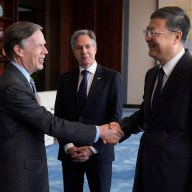Don’t blame Hugh Jackman.
This versatile performer clearly showed up for the Oscars prepared to put his all into the hosting job.
He was a solid choice to help bring needed new life to what’s all-too-routinely billed as “Hollywood’s biggest night.”
As an actor, movie star, song-and-dance man and People magazine’s “Sexiest Man Alive” (among other credentials), Jackman would seem to be capable of most anything.
Maybe he’d even be willing to try fixing the economy.
At any rate, the sorry state of the economy flavoured Jackman’s opening performance.
“Due to cutbacks, the Academy said they didn’t have enough money for an opening number,” Jackman declared. “I’m going to do one anyway.”
And he did, with a musical tribute to the year’s nominated films cleverly staged with tatty, bargain-basement props (and help from Anne Hathaway, summoned from her seat in the audience).
Then, charmingly, Jackman greeted and kidded many of the nominated stars in the hall.
After saying hello to Angelina Jolie and Brad Pitt, Jackman admitted “I actually don’t have a joke for them, I’m just contractually obligated to mention them at least five times during the show. That’s once.”
No knee slappers here, but when it’s Hugh Jackman voicing them, who cares? The key word: charm.
But he’s only human. And he’s only one man.
Less than 12 minutes into the broadcast, he stepped away. After a curtain miscue and some disjointed film clips, the Best Supporting Actress Oscar was presented. By not one, or two, presenters – but by five past winners. A nice gesture, but a talky, overpopulated way to get on with the necessary business.
It was an early warning signal. Was this the best the revamped Oscars could do?
Comedy dream team Tina Fey and Steve Martin picked up the pace a bit, presenting Best Original and Adapted Screenplays. (At one point, Martin departed from his boilerplate setup to turn to Fey: “Don’t fall in love with me,” he cautioned her.)
Jennifer Aniston and Jack Black came next, slowing things down again to announce the Best Animated Feature and Best Animated Short Film.
Gee, this was starting to feel overly familiar. Which is to say laboured, self-reverential and disappointing.
Along with Jackman presiding, this year’s Oscarcast was supposed to be stylistically new and invigorated. In a year when Oscar winners seemed more predictable than usual, the night’s suspense for many viewers had been diverted to wondering whether the broadcast itself would successfully deliver a few welcome surprises.
But what passed for surprises was an overformatted style that seemed to turn the night into a Learning Annex short course in how movies are made.
One amusing segment: A filmed bit with Seth Rogen and James Franco in their “Pineapple Express” personas, settling on their couch to watch bootlegged copies of some of the year’s favourite features (including a few that the Academy pointedly ignored).
As was widely expected, the late Heath Ledger was honoured as the Best Supporting Actor. That announcement, and the standing ovation it inspired in the hall, were moving nonetheless.
The much-anticipated tribute to Jerry Lewis was mostly notable for the brevity of his acceptance remarks.
Midway through the broadcast, Jackman, in top hat and tails, decreed that the success of “Mamma Mia” proves movie musicals are back. With that, he launched into an old-fashioned production number drawing on classic movie musicals with the able assistance of Beyonce and other stars, and an enormous dance troupe.
But like too much of the evening, it was tightly, um, choreographed.
By contrast, the night’s crowning moment – actually, just a couple of seconds – was thanks to Philippe Petit, the tightrope-walking subject of Best Documentary-winning “Man on Wire.” He not only gave his thanks for the Oscar but balanced the statuette on his chin.
If only the rest of the Oscarcast could have struck that kind of balance.
















